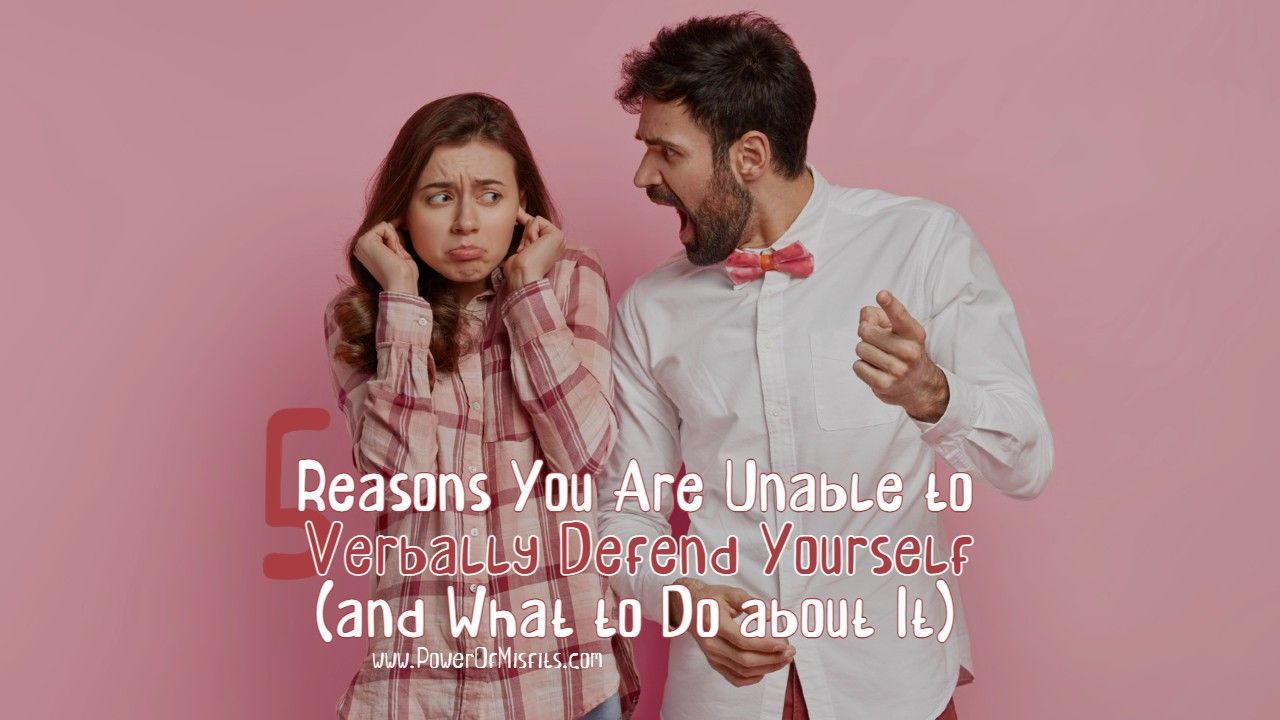Even though I’m not a shy person or a people pleaser, I’ve never been able to verbally defend myself. Good comebacks always come to my mind long after the conversation. If I happen to have an argument with someone, I’m prone to these kinds of thoughts days after it:
I should have said this. Why didn’t I say that? I wish I had replied this way!
Sounds familiar? If you have the same problem, you will want to know the reasons behind it and ways to deal with it.
Why Am I Unable to Verbally Defend Myself?
There can be many reasons why someone is not good at defending themselves from verbal attacks, and not all of them have to do with insecurities and personality flaws.
Here are just a few explanations:
1. You are an introvert
Typically, the quiet ones aren’t good at two things:
- putting our thoughts into words by speaking;
- dealing with confrontation.
Introverts are highly introspective and considerate, so these traits may slow down our reactions. That’s the reason we are much more effective in written communication, as it gives us the time to think over what we say.
Then it’s the introvert best friend: avoidance. Since our energy resources are limited, we tend to avoid situations and people that drain them out. And what can be more draining than a heated argument? That’s why our automatic response to a conflict situation is withdrawal.
So, when someone attacks us, we may choose to stay silent, hoping that the conversation ends quickly. My introversion is the main reason I’ve never been able to verbally defend myself.
2. You are a slow thinker
Some people are slow thinkers, so they take their time to come up with good replies or comebacks. They need to process what they heard first, and only after that they can say something in return.
If someone verbally attacks you, especially when you don’t expect them to, you feel lost. You don’t know how to react and what to say.
So, you are just listening without saying a word. Or you may mumble some excuse. To the other person, it looks like you can’t defend yourself. Obviously, it’s a sure way to lose arguments.
3. You don’t have good communication skills
Not everyone is an effective communicator. Some people seem to know exactly how to approach arguments and difficult conversations. It’s like they always have a few great comebacks up their sleeve.
Others sound more confusing than convincing when they try to put their thoughts into words. If you don’t have good communication skills, every attempt to verbally defend yourself fails.
The words coming out of your mouth don’t sound as powerful and convincing as in your head, and the other person is using this against you.
4. You have insecurities
Then there are also people with low self-worth. Instead of verbally defending themselves during an argument, they focus on feelings of self-pity, fueled by the other person’s words.
For example, you are an insecure person and you are having an argument with your mother, who happens to be pretty judgmental and critical. She makes nasty remarks that make you feel like a failure.
As a result, you dwell on these feelings and start to question yourself. What if she is right and you will never succeed in life? What if you are indeed worthless?
A person with insecurities can easily fall into the trap of self-doubt and self-criticism, especially if someone verbally attacks them.
5. You tend to avoid conflict
Another typical reason you struggle with verbally defending yourself is that you find it easier to withdraw from an argument. You don’t like confrontation—maybe you are afraid of it or find it too wearing, so you prefer to stay silent or just walk away.
You know that if you start to defend yourself, it will fuel the conflict even more. Therefore, not saying anything is your conscious choice, especially if you know that the person you are talking to won’t listen. Why waste time and energy on pointless arguments?
So, you just say nothing and wait until the conversation is over.
“I’ve Never Been Able to Verbally Defend Myself” — 5 Tips
1. Don’t babble
It’s easy to start babbling or mumbling when you don’t know what to say. You are trying to defend yourself from a verbal attack, but you struggle to find the right words.
However, this manner of speaking won’t help you out in an argument. Quite the opposite is true—it will give the other person the upper hand, so they will heighten the tension even further. It’s better to not say anything than babble, mumble, or try to find excuses to justify yourself.
2. Set boundaries
What to do if you don’t know what to say in your defense? What if you struggle to think up a good comeback when someone verbally attacks you?
If the other person is being mean, let them know that their words are hurting you. Sometimes calling someone out for their manner of speaking is the best way to defuse a verbal attack. If they’ve lost their temper, it can help them realize that they are crossing the line.
We are all worthy of respect, and you should let no one call you names or speak to you in a disrespectful manner.
Of course, this doesn’t work with everyone. Some people just don’t care about how they sound, others are not emotionally close to you to worry about your feelings. For example, you won’t talk to a random guy at the grocery store about your hurt feelings, will you?
However, if you are having an argument with a family member, a friend, or a romantic partner, this tactic can help you calm the situation down.
3. Walk away
The problem with being unable to deal with verbal attacks is that you end up listening to the other person’s criticisms while saying nothing in your defense. But you don’t have to sit and listen. You can always walk away.
Hang up that phone. End that annoying conversation. Just leave.
To walk away gracefully, use an excuse and let the other person know that it’s not a good moment. Chance is that when you talk to them the next time, they won’t be angry with you anymore.
This trick works best with people with choleric temperament, as they lose their temper and calm down faster than others.
Withdrawing from an argument also shows the other person that you won’t tolerate verbally abusive behavior. This is how you set and protect your personal boundaries.
4. Don’t feel bad about yourself
Sometimes I hate the fact that I’ve never been able to verbally defend myself. After all, I’m not a socially anxious teen anymore! I’m an adult now, but I still don’t know how to handle arguments. This is pretty disappointing.
This kind of behavior may look like weakness, so I’m sure that you’ve felt bad about yourself too, just because you can’t come up with a good comeback. However, as explained above, being unable to verbally defend yourself doesn’t always stem from some kind of flaw.
Sometimes it has to do with the way your brain works. It can also boil down to your communication skills.
We can’t be good at everything, and those people who always find the right thing to say in an argument have weaker sides too. Yes, they win arguments, but they can be totally useless at something you excel at. Think about it.
Therefore, there is no point in feeling weak or worthless just because you are not good at handling arguments and verbally defending yourself.
5. Use an affirmation to boost your confidence
This trick is particularly effective if you suffer from low self-esteem. When someone verbally attacks you, repeat a confidence-boosting statement in your mind. It’s much better than listening to someone’s criticisms, which may pave the way for self-doubt and self-loathing.
Here are some examples of affirmations:
I am worthy.
I am confident.
I know my worth and I let no one question it.
Check out this guide for more affirmations for confidence and self-esteem.
Repeating a positive ‘mantra’ will prevent you from feeling not good enough because of other people’s verbal attacks. It’s also a great way to cope when you can’t openly confront the other person, for example, when your boss tells you off.
To sum up, I’ve never been able to verbally defend myself, and I still feel bad about it sometimes. But in the end, it doesn’t matter. I’m not going to become a politician or something, so I don’t really need the art of debate in my daily life! 🙂
If you struggle with defusing verbal attacks too, accept the fact that it’s not your forte and move on. Plus, you can always improve your assertiveness and communication skills!
Featured image by wayhomestudio on Freepik



